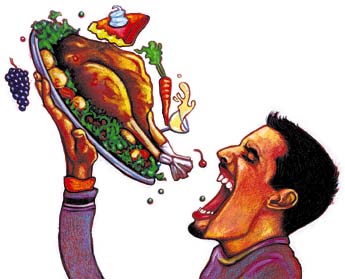What Causes Weight Gain

It’s easy to think that weight gain is controlled only by the mechanism of calories in and energy out. Although this is mostly the case, and you certainly won’t lose weight unless you burn more calories than you consume, there are a number of other reasons for weight gain – and you may find some of them surprising.
Dieting
It’s official! Studies now prove conclusively that dieting makes you fat. It’s simple really. When you restrict your food intake, your body thinks there’s a shortage of food and it doesn’t know how long this “famine” is going to last. As a result, it does a number of things.
First, your body slows down your metabolism so you don’t’ burn so many of the calories it thinks are scarce; and, second, it lets go of muscle and water first to preserve your fat reserves. The overall result is that it looks as though you’re losing weight, but in reality, you’re losing water and muscle and slowing down your metabolism. The result is that you eat like a bird, but after an initial loss, your weight plateaus. When you eat normally again, the weight piles on – as fat.
Overeating and under-exercising
“Calories in” have to be fewer than “calories out” for you to lose weight. If they’re greater, you’ll gain weight. However, it isn’t quite that simple. To lose weight sustainably, you need to consider not just how many calories you consume, but what type. You need to eat healthy food from the three food groups: fats (mainly unsaturated fats), carbohydrates (mainly unrefined carbohydrates and healthy simple carbohydrates, such as fruit), and protein (such as fish, eggs, nuts, seeds). Omit one of these three important food groups and you’ll hamper your efforts at weight loss.
Many overweight women simply eat too much bad fat and too many refined carbohydrates (such as cookies and cakes). Low-fat and no-fat diets don’t’ work, either because they restrict the essential fats that help boost your metabolism. In addition, no-fat and low-fat foods often contain other unhealthy ingredients (often salt or sugar) to make them tastier. Anything that contains extra sugar triggers blood-sugar imbalances, encouraging weight gain.
Nutritional deficiencies
You need good levels of vitamins, minerals, essential fats, and amino acids for your body to be in good health and for it to burn off excess fat when appropriate. If your body registers that you have an increased need for certain vitamins and nutrients, it can create cravings. Or, if you have a particular nutritional deficiency, it may increase your appetite in the hope of plugging the gaps. If you respond by eating food that’s of poor quality and lacking in nutrients, your body may continue to prompt you to eat in order to get enough nourishment – the cravings go on, and so does the weight.
Food intolerances and allergies
A food intolerance is a reaction to certain foods that doesn’t involve your immune system – perhaps you lack certain enzymes that permit your body to process a food correctly, resulting in abdominal pain or nausea. A food allergy, on the other hand, involves an immune reaction. Your immune system thinks you’ve eaten something harmful and releases histamine to defuse the harmful substance. Common allergic reactions include hives, rashes, and throat swelling. Perversely, reactions as a result of some food intolerance can lead to a slight addiction to the culprit food, leading you to crave and then overeat that food and so gain weight.
Prescription drugs
Some drugs can cause weight gain. The most obvious culprits are steroids – although never be tempted to come off steroids suddenly, always talk to your doctor first. The pill, hormone replacement therapy, and anti-depressants may also cause weight gain.
Artificial sweeteners
Sugar is fattening, and many women use artificial sweeteners to help them to cut calories. Ironically, though, artificial sweeteners can actually increase your appetite, causing you to gain weight. The problem is that because they give you a sweet taste without the calories, your brain gets confused and starts looking for the “missing” calories by triggering your appetite.
Candida infection (yeast overgrowth)
If you suffer from a yeast infection, such as Candida, your digestion is compromised because the proportion of “healthy” bacteria in your gut is low in comparison to “unhealthy” bacteria. If your digestion is poor, you aren’t getting the nutrients you need to lose weight.

